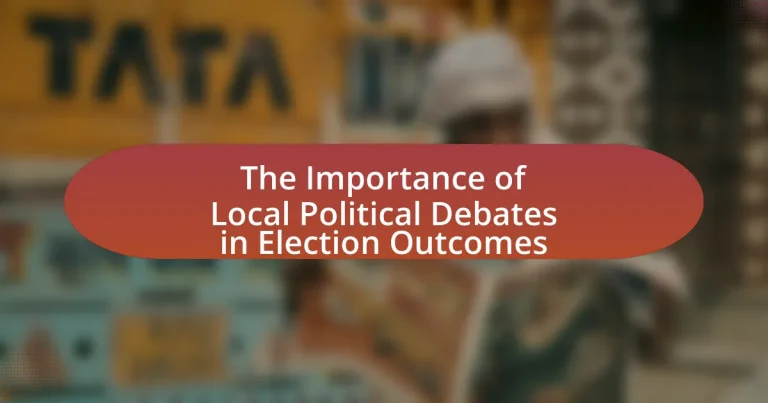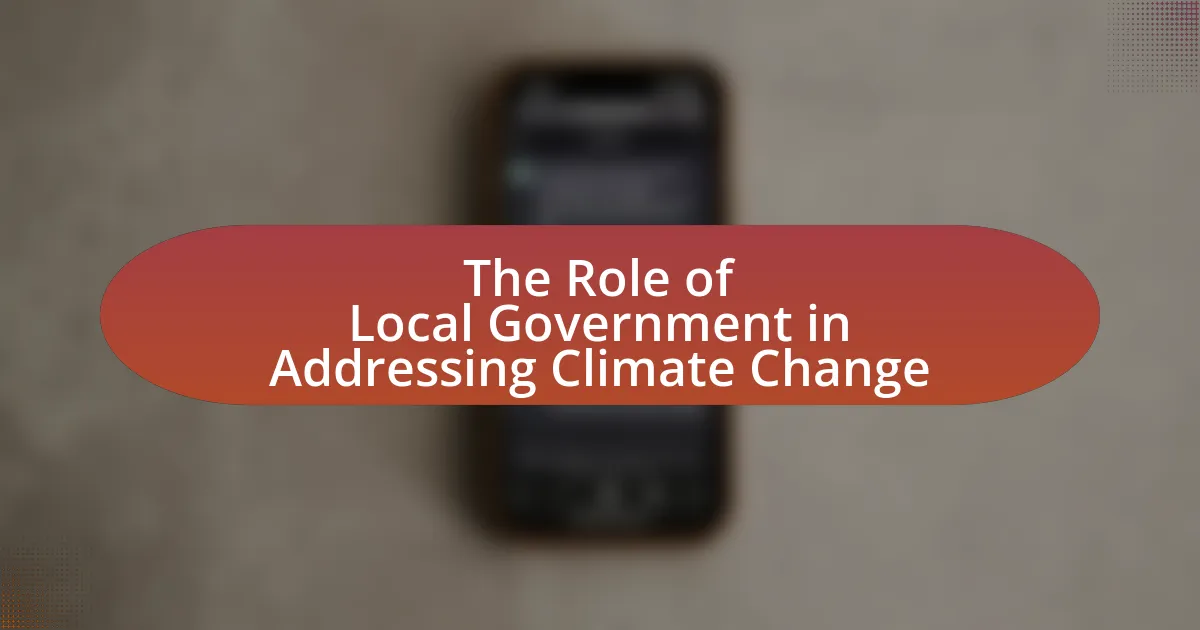Local political debates play a crucial role in shaping election outcomes by providing candidates with a platform to present their policies and engage directly with voters. These debates enhance voter awareness, influence perceptions, and can sway undecided voters, ultimately impacting polling numbers and turnout rates. The effectiveness of debates is influenced by factors such as candidate messaging, audience engagement, and debate formats, while media coverage and social media further amplify their reach and significance. Additionally, best practices in debate organization and moderation are essential for fostering a fair and informative environment that promotes transparency and accountability in the electoral process.
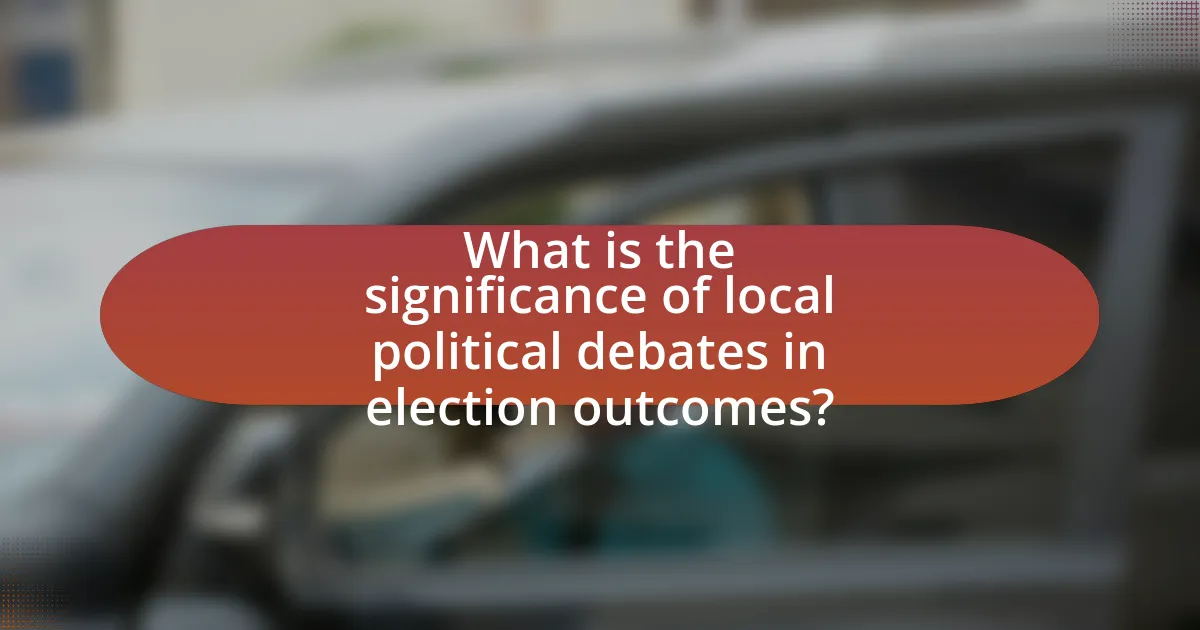
What is the significance of local political debates in election outcomes?
Local political debates significantly influence election outcomes by providing candidates a platform to articulate their policies and engage directly with voters. These debates enhance voter awareness and understanding of key issues, allowing constituents to make informed decisions. Research indicates that candidates who perform well in debates often experience a boost in polling numbers; for instance, a study by the Pew Research Center found that 63% of voters reported that debates helped them decide whom to vote for. Additionally, local debates can sway undecided voters, as they showcase candidates’ personalities and responsiveness to community concerns, ultimately impacting the election results.
How do local political debates influence voter perceptions?
Local political debates significantly influence voter perceptions by providing a platform for candidates to articulate their policies and engage directly with constituents. These debates allow voters to assess candidates’ communication skills, knowledge, and ability to address local issues, which can shape their opinions and voting decisions. Research indicates that candidates who perform well in debates often experience a boost in polls; for instance, a study by the Pew Research Center found that 63% of debate watchers reported that the debates helped them make a more informed choice. This direct interaction and visibility can enhance candidates’ relatability and credibility, ultimately impacting voter turnout and election outcomes.
What role do debates play in shaping candidate images?
Debates play a crucial role in shaping candidate images by providing a platform for candidates to present their policies, respond to opponents, and engage with voters directly. This interaction allows candidates to showcase their communication skills, knowledge, and ability to think on their feet, which can significantly influence public perception. For instance, a study by the Pew Research Center found that 67% of voters reported that debates helped them form opinions about candidates, highlighting their impact on voter decision-making. Additionally, memorable moments or gaffes during debates can become defining aspects of a candidate’s image, further solidifying their public persona.
How do debates affect voter engagement and turnout?
Debates significantly enhance voter engagement and turnout by providing a platform for candidates to present their policies and engage with voters directly. Research indicates that debates increase public interest in elections, as they allow voters to compare candidates side-by-side, fostering informed decision-making. For instance, a study by the Pew Research Center found that 63% of debate viewers reported feeling more engaged in the electoral process, leading to higher turnout rates. Additionally, debates often highlight key issues, motivating undecided voters to participate, as evidenced by the increase in voter turnout during election years with high-profile debates.
Why are local political debates essential for democracy?
Local political debates are essential for democracy because they facilitate informed citizen participation in the electoral process. These debates provide a platform for candidates to present their policies, engage with constituents, and address community-specific issues, thereby enhancing transparency and accountability. Research indicates that communities with active debate participation experience higher voter turnout, as citizens feel more connected to the electoral process and better equipped to make informed decisions. For instance, a study by the Pew Research Center found that 62% of voters reported that debates helped them understand candidates’ positions better, reinforcing the role of debates in fostering an informed electorate.
How do debates promote transparency and accountability?
Debates promote transparency and accountability by providing a public platform for candidates to present their policies and respond to questions from the electorate. This open exchange allows voters to assess candidates’ positions and qualifications directly, fostering an informed electorate. Research indicates that when candidates engage in debates, they are more likely to disclose their plans and face scrutiny, which can lead to more responsible governance. For instance, a study by the Pew Research Center found that 66% of voters believe debates help them understand candidates’ views better, thereby enhancing accountability.
What impact do debates have on public discourse and civic participation?
Debates significantly enhance public discourse and civic participation by providing a platform for candidates to articulate their positions and engage with voters. This interaction fosters informed decision-making among the electorate, as evidenced by studies showing that voters who participate in debates are more likely to engage in discussions about political issues and increase their likelihood of voting. For instance, a study by the Pew Research Center found that 63% of debate viewers reported feeling more informed about the candidates’ policies, which directly correlates with higher voter turnout. Thus, debates serve as a crucial mechanism for stimulating civic engagement and enriching the democratic process.
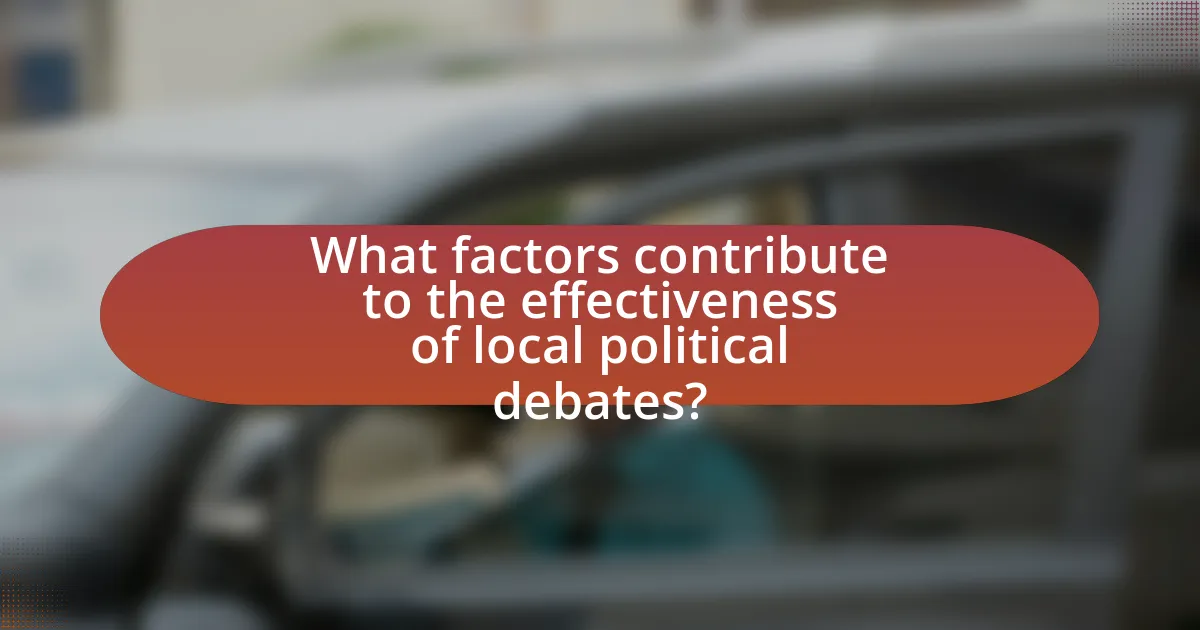
What factors contribute to the effectiveness of local political debates?
The effectiveness of local political debates is primarily influenced by the clarity of candidates’ messages, audience engagement, and the format of the debate. Clear messaging allows candidates to communicate their policies and positions effectively, which is essential for voter understanding. Audience engagement, including the ability to respond to questions and interact with constituents, fosters a connection that can sway public opinion. Additionally, the debate format, whether it includes direct questioning or structured responses, impacts how well candidates can articulate their views and how voters perceive them. Research indicates that debates with higher audience interaction lead to increased voter interest and participation, thereby enhancing the overall impact of the debates on election outcomes.
How does the format of a debate influence its impact?
The format of a debate significantly influences its impact by shaping the way arguments are presented and perceived by the audience. For instance, structured formats, such as Lincoln-Douglas or team debates, encourage clarity and organization, allowing participants to articulate their positions effectively. Research indicates that debates with clear rules and time limits enhance audience engagement and retention of information, as seen in studies conducted by the National Communication Association, which found that structured debates lead to higher levels of understanding among viewers. Additionally, the use of formats that include audience interaction, such as town hall debates, can increase voter connection to candidates, thereby influencing election outcomes more profoundly.
What are the different formats used in local political debates?
Local political debates utilize several formats, including town hall meetings, moderated debates, and candidate forums. Town hall meetings allow candidates to engage directly with voters in an informal setting, fostering open dialogue. Moderated debates typically involve a neutral moderator who poses questions to candidates, ensuring structured responses and time limits. Candidate forums are organized events where candidates present their platforms and answer questions from the audience or panelists. These formats are essential for informing voters and influencing election outcomes, as they provide a platform for candidates to articulate their positions and engage with constituents.
How does audience participation affect debate outcomes?
Audience participation significantly influences debate outcomes by shaping the perceptions and decisions of both candidates and voters. Engaged audiences can sway the momentum of a debate through their reactions, such as applause or boos, which can impact candidates’ performances and strategies. Research indicates that debates with active audience involvement often lead to higher voter engagement and can alter public opinion, as seen in the 2008 U.S. presidential debates where audience reactions were shown to correlate with shifts in polling data. This dynamic illustrates that audience participation not only enhances the debate experience but also plays a crucial role in determining the effectiveness of candidates’ messages and their overall electoral success.
What role does media coverage play in local political debates?
Media coverage plays a crucial role in local political debates by shaping public perception and influencing voter engagement. It provides a platform for candidates to present their views and policies, while also informing the electorate about key issues. Studies show that increased media exposure correlates with higher voter turnout; for instance, a 2018 analysis by the Pew Research Center found that local news coverage significantly impacts voter awareness and participation in elections. Furthermore, media coverage can highlight discrepancies in candidates’ statements, fostering accountability and informed decision-making among voters.
How does media framing influence public perception of candidates?
Media framing significantly influences public perception of candidates by shaping the narrative around their actions, policies, and character. When media outlets emphasize specific aspects of a candidate’s platform or personal life, they can create a biased portrayal that affects how voters interpret that candidate’s suitability for office. For instance, a study by Entman (1993) highlights that framing can lead to different interpretations of the same event based on the context provided by the media, thereby impacting public opinion. Additionally, research from the Pew Research Center indicates that voters are more likely to remember and be influenced by stories that align with their pre-existing beliefs, demonstrating the power of framing in reinforcing or altering perceptions.
What are the effects of social media on debate reach and engagement?
Social media significantly enhances the reach and engagement of political debates. Platforms like Twitter and Facebook allow for real-time interaction and sharing, which can amplify the visibility of debates beyond traditional media channels. For instance, a study by the Pew Research Center found that 69% of adults in the U.S. use social media, and 57% of those users have engaged in political discussions online, indicating a substantial audience for debate-related content. Additionally, social media facilitates the dissemination of debate highlights and key moments, leading to increased viewer engagement and participation in discussions. This dynamic interaction can influence public opinion and voter mobilization, ultimately impacting election outcomes.
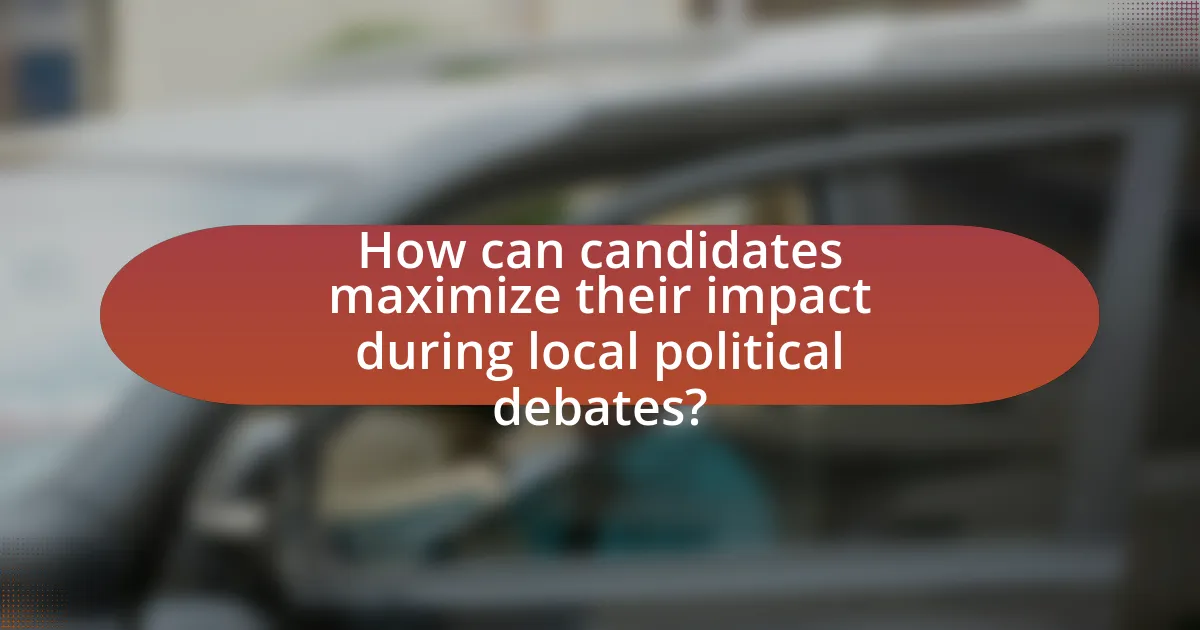
How can candidates maximize their impact during local political debates?
Candidates can maximize their impact during local political debates by effectively communicating their key messages and engaging with the audience. This involves preparing clear, concise talking points that resonate with local issues, demonstrating knowledge of community concerns, and actively listening to opponents and audience questions. Research indicates that candidates who connect emotionally with voters and present relatable narratives are more likely to leave a lasting impression, as seen in the 2016 U.S. presidential debates where candidates who shared personal stories garnered higher viewer engagement. Additionally, utilizing body language and maintaining eye contact can enhance credibility and relatability, further solidifying their presence in the debate.
What strategies should candidates employ to prepare for debates?
Candidates should employ thorough research, practice, and strategic messaging to prepare for debates. Research involves understanding key issues, opponent positions, and audience concerns, which allows candidates to formulate informed responses. Practicing debate scenarios helps candidates refine their delivery and anticipate questions, enhancing their confidence and performance. Strategic messaging focuses on clear, concise communication of key points that resonate with voters, ensuring that candidates effectively convey their platforms. These strategies are supported by studies indicating that well-prepared candidates tend to perform better in debates, influencing voter perceptions and election outcomes.
How can candidates effectively communicate their key messages?
Candidates can effectively communicate their key messages by utilizing clear, concise language and focusing on key issues that resonate with their audience. This approach ensures that their core messages are easily understood and remembered by voters. Research indicates that candidates who employ storytelling techniques and relatable examples can enhance message retention, as evidenced by a study from the University of Southern California, which found that narratives significantly improve audience engagement and comprehension. Additionally, candidates should actively listen to voter concerns during debates, allowing them to tailor their messages to address specific community needs, thereby increasing the relevance and impact of their communication.
What techniques can candidates use to handle challenging questions?
Candidates can use techniques such as active listening, pausing before responding, and reframing questions to handle challenging inquiries effectively. Active listening allows candidates to fully understand the question, ensuring they address the core issue. Pausing before responding gives candidates time to formulate a thoughtful answer, reducing the likelihood of an impulsive or inadequate response. Reframing questions can help candidates steer the conversation toward their strengths or key messages, allowing them to maintain control of the dialogue. These techniques are supported by communication studies that emphasize the importance of strategic responses in high-pressure situations, demonstrating that well-prepared candidates can significantly improve their performance in debates.
What common pitfalls should candidates avoid in debates?
Candidates should avoid common pitfalls such as failing to prepare adequately, engaging in personal attacks, and not addressing the audience’s concerns. Adequate preparation is crucial, as candidates who do not understand their topics or opponents often struggle to articulate their positions effectively. Engaging in personal attacks can alienate voters and detract from the substantive issues at hand, as evidenced by studies showing that negative campaigning can lead to decreased voter engagement. Additionally, candidates must focus on the audience’s concerns; ignoring these can result in a disconnect that diminishes their appeal, as seen in various local debates where candidates who failed to connect with constituents lost support.
How can candidates ensure they remain authentic and relatable?
Candidates can ensure they remain authentic and relatable by consistently communicating their personal values and experiences. This approach fosters a genuine connection with voters, as authenticity resonates with individuals seeking relatable leaders. Research indicates that candidates who share personal stories and demonstrate vulnerability are perceived as more trustworthy; for instance, a study by the Pew Research Center found that 70% of voters value personal stories in political communication. By engaging in active listening and addressing community concerns, candidates can further enhance their relatability, ensuring their messages align with the electorate’s needs and sentiments.
What are the risks of negative campaigning during debates?
Negative campaigning during debates poses several risks, including alienating voters, damaging candidate credibility, and fostering a toxic political environment. When candidates focus on attacking opponents rather than presenting their own policies, they may turn off undecided voters who prefer constructive dialogue. Research from the Pew Research Center indicates that negative ads can lead to increased voter cynicism and disengagement, ultimately affecting voter turnout. Additionally, candidates who engage in negative campaigning risk being perceived as untrustworthy, which can diminish their appeal. A study published in the Journal of Politics found that negative campaigning can backfire, leading to a backlash against the candidate employing such tactics, thereby harming their overall electoral prospects.
What best practices can enhance the quality of local political debates?
To enhance the quality of local political debates, implementing structured formats, ensuring equal speaking time, and promoting fact-checking are essential best practices. Structured formats, such as predetermined questions and time limits, help maintain focus and clarity, allowing candidates to address key issues effectively. Equal speaking time ensures that all candidates have an opportunity to present their views, fostering a fair environment that encourages diverse perspectives. Additionally, incorporating real-time fact-checking during debates can help combat misinformation, as studies show that informed voters make better decisions, ultimately leading to more meaningful engagement in the electoral process.
How can organizers ensure a fair and balanced debate environment?
Organizers can ensure a fair and balanced debate environment by implementing strict guidelines for participant conduct and establishing clear rules for debate format. These guidelines should include equal speaking time for all participants, impartial moderation, and a transparent selection process for debate topics. Research indicates that structured formats, such as the use of time limits and predefined questions, help maintain focus and fairness, as seen in studies conducted by the National Institute for Civil Discourse, which emphasize the importance of equitable participation in political discussions. Additionally, providing a neutral venue and ensuring that all participants have access to the same resources further supports a balanced environment, fostering a more productive and fair debate.
What role do moderators play in facilitating effective debates?
Moderators play a crucial role in facilitating effective debates by ensuring that discussions remain focused, balanced, and respectful. They guide the flow of conversation, enforce time limits, and pose questions that encourage critical thinking and engagement among participants. For instance, a study by the Pew Research Center highlights that well-structured moderation can lead to a 30% increase in audience understanding of key issues during debates. This structured approach helps maintain order and allows for diverse viewpoints to be expressed, ultimately enhancing the quality of the debate and informing voters more effectively.
